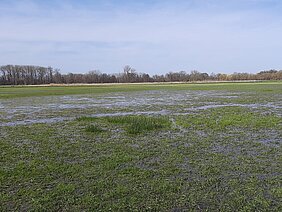Near-natural peatlands and floodplains fulfil important functions as carbon reservoirs, water retention areas and habitats for endangered species, which serve both to protect the climate and biodiversity as well as to prevent flooding and drought. In Germany, however, around 94 percent of peatlands are drained and almost all floodplains are cut off from rivers. As a result of drainage, the carbon bound in the peatlands over thousands of years is released into the atmosphere and valuable soil is lost. Although drained peatlands only account for 7% of Germany's agricultural land, they are responsible for 37% of greenhouse gas emissions from agriculture. This situation can only be reversed by rewetting.
On 27 June 2024, the German National Academy of Sciences Leopoldina published a new statement highlighting the need to rewet peatlands and renaturalise floodplains in order to achieve climate targets, prevent flooding and protect biodiversity. ATB scientist and Head of the Technology Assessment Department Prof Dr Annette Prochnow contributed to the statement in the Leopoldina working group "Climate, Biodiversity, Raw Materials: For an Integrated Use of Peatlands and Floodplains". The statement outlines options for action to rewet peatlands and renaturalise floodplains while at the same time using them economically.
"The rewetting of drained peatlands is a key step towards protecting our environment and achieving our climate targets. We have to jointly develop practicable solutions that simultaneously enable the adapted use of wet land and create perspectives and alternative income opportunities for farms," emphasises Annette Prochnow. "The development and establishment of value chains is essential and should involve all relevant stakeholders."
At ATB, we are working on various projects to develop solutions for the utilisation of rewetted peatlands ( in short: paludiculture) in order to develop and test technology for the management of wet areas and biomass utilisation, identify value creation networks and bring stakeholders together. In the future, reeds, reed canary grass and other peatland plants could be used to produce construction and packaging materials, for example.
Further information:
Press release of the Leopoldina
Contact:
Prof. Dr. Annette Prochnow
Telefon: +49 331 5699-210
Email: aprochnow@atb-potsdam.de

